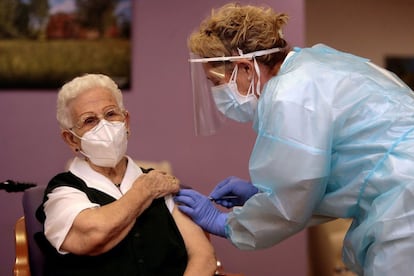Is a fourth Covid vaccine dose necessary?
Booster shots should be planned to coincide with times of the year when there is greater risk

Evidence suggests that a fourth dose of the Covid-19 vaccine by Moderna and Pfizer-BioNTech are key to protecting the immunocompromised and the elderly. However, recent studies show that a fourth dose cannot increase or lengthen the immune response that has been generated by the third.
That said, there are vaccines with recombinant proteins that may be able to boost the immune response. This still has to be confirmed by clinical studies that are currently underway. Until now, nearly all trials have focused on messenger RNA vaccines, such as the ones developed by Moderna and Pfizer-BioNTech. The Covid-19 vaccine by the Spanish pharmaceutical company Hipra is one example of a recombinant protein vaccine. It is now in a clinical trial and is expected to be approved in the coming months.
When we talk about messenger RNA vaccines, we know that the third dose increases the immune response for a longer period than the second dose. However, the fourth dose does not exceed the maximum levels obtained with the third, and its effect wears off about three months after vaccination. That’s why a fourth dose should be given when there is high community transmission of the virus and a very high risk of contagion. The next booster shots of the vaccine should be planned to coincide with times of the year when there is greater risk, as occurs with the flu vaccine.
But remember, the fourth dose does protect vulnerable populations. During the omicron wave, fourth doses of mRNA vaccines reduced the risk of death for people living in nursing homes and older people for at least two months. These results suggest that a fourth dose can prevent mortality among at-risk populations, but they also show that this protection is only for a limited time. For this reason, the most vulnerable should be vaccinated in the epidemiological moments of greatest risk.
Being able to anticipate these moments and provide Covid booster shots to the elderly and immunocompromised will be crucial to containing excess mortality. In 2022, excess mortality continued to be recorded despite countries having high vaccination rates.
We must remember that, after having been infected by the virus, our immune system will be at an optimal level to respond to a new infection for a few months. This should also be taken into account when it comes to deciding when to get a booster shot, since it would not make sense to get one right after having Covid.
Nuria Izquierdo-Useros is a doctor in biology and the head of the emerging pathogens group at IrsiCaixa.
Tu suscripción se está usando en otro dispositivo
¿Quieres añadir otro usuario a tu suscripción?
Si continúas leyendo en este dispositivo, no se podrá leer en el otro.
FlechaTu suscripción se está usando en otro dispositivo y solo puedes acceder a EL PAÍS desde un dispositivo a la vez.
Si quieres compartir tu cuenta, cambia tu suscripción a la modalidad Premium, así podrás añadir otro usuario. Cada uno accederá con su propia cuenta de email, lo que os permitirá personalizar vuestra experiencia en EL PAÍS.
¿Tienes una suscripción de empresa? Accede aquí para contratar más cuentas.
En el caso de no saber quién está usando tu cuenta, te recomendamos cambiar tu contraseña aquí.
Si decides continuar compartiendo tu cuenta, este mensaje se mostrará en tu dispositivo y en el de la otra persona que está usando tu cuenta de forma indefinida, afectando a tu experiencia de lectura. Puedes consultar aquí los términos y condiciones de la suscripción digital.








































